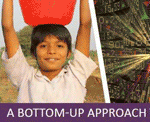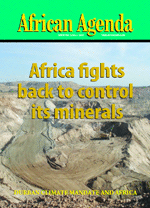News
Published on Thu, 2012-04-19 14:17

A meeting of the CSO Forum:
Yao Graham (TWN Africa),
Amel Affouz (UNCTAD),
Hamish Jenkins (UN-NGLS) and
Mohammed Abdulla Al-Maadeed
(NHRC). (Photo: UNCTAD)
|
The Group of 77 and China, along with civil society organizations (CSOs), come out in defence of the United Nations Conference on Trade and Development (UNCTAD), threatened by several rich nations that are trying to minimize its mandate and its ability to give advice to developing countries.
The CSO Forum of UNCTAD XIII that began this week in Doha, Qatar, raised questions about the “business as usual” approach to policies of trade, investment, finance and cooperation. The participants also noted that a key lesson from the global financial crisis is the need to recognize the important role of the state in economic development.
|
Published on Wed, 2012-04-18 08:36
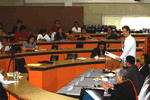
Launch ceremony of the project
last year, at the University of the
Philippines. (Photo: UCA News)
|
The non governmental organization Code: Reforms for Economic Development (Code: RED) and Social Watch Philippines launched a policy monograph on transparency and accountability in local governance, after several months of workshops in six municipalities to allow grassroots groups to get more involved in local public finance.
|
Published on Tue, 2012-04-17 08:31
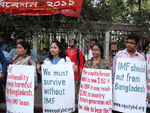
Protest against the IMF in Dhaka
|
Equity and Justice Working Group (EquityBD), a Bangladeshi alliance of rights-based civil society organizations, urges the government in Dhaka to open public and parliamentary debates in case of receive foreign loans in the name of assistance and development. The statement issued by the coalition in its regard refers to a 987 million dollars loan approved last week by the International Monetary Fund (IMF).
|
Published on Mon, 2012-04-16 08:37
"The human rights movement faces an unprecedented opportunity for revisiting and revitalizing the struggle for economic and social rights by demanding accountability for failures to protect human rights through economic policy. The establishment of a Financial Transaction Tax would be an important step in that human rights direction," argues in its third publication the initiative “A bottom up approach to righting financial regulation”, a consortium of civil society networks and organizations, including Social Watch and some of its members.
|
Published on Thu, 2012-04-12 08:34
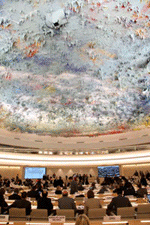
Session of the Human Rights
Council, Palais des Nations,
Geneva. (UN Photo/JeanMarc Ferre)
|
Twenty-two independent experts and special rapporteurs of the United Nations Human Rights Council called on the states to incorporate universally agreed international human rights norms and standards with strong accountability mechanisms into the goals to be agreed at the UN Conference on Sustainable Development (Rio2012) to be held in June. The appeal coincides with long-standing proposals made by civil society organizations.
The petition includes the setting of “indicators and measures to evaluate implementation of the commitments” to be agreed in Rio de Janeiro “through an inclusive, transparent and participatory process with all relevant stakeholders, including civil society”, wrote the experts in an open letter.
|
Published on Wed, 2012-04-11 08:39
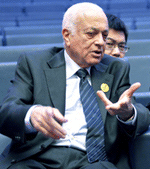
Nabil el-Araby, secretary general
of the Arab League.
(UN Photo/Mark Garten)
|
The development and reform of the Arab League requires the adoption of serious steps, on top of which a new vision for its relationship with civil society, in line with the traditions and experiences established by similar regional groupings as well as the United Nations, suggested 37 organizations, some of them members of Social Watch, of nine Arab countries.
|
Published on Tue, 2012-04-10 15:07
 |
|
Roberto Bissio, Leymah Gbowee, Justin Kilcullen, Graça Machel and Kumi Naidoo
|
Beyond 2015, a global civil society campaign pushing for a strong and legitimate successor framework to the Millennium Development Goals, recommended to the United Nations Secretary General, Ban Ki-moon, five civil society representatives onto the UN High Level Panel on a post-2015 development framework when it is established.
|
Published on Mon, 2012-04-09 13:14

The 144th Session of the
Inter-American Commission on
Human Rights. (Photo: HRBrief)
|
Over the last 30 years, more than 600 aboriginal woman and girls have been murdered or gone missing in Canada. The Inter-American Commission on Human Rights (IACHR) addressed this issue for the first time following a petition by Native Women’s Association of Canada (NWAC), the Canadian Feminist Alliance for International Action (FAFIA, one of the focal points of Social Watch in that country) and the University of Miami’s Human Rights Clinic.
|
Published on Mon, 2012-03-26 11:21

Members of Syrian security forces.
(Photo: FreedomHouse2/Flickr/CC)
|
The use of military action is intensifying in Syria, and the human rights and humanitarian conditions are deteriorating, warned the Arab NGO Network for Development (ANND) and the World Alliance for Citizen Participation (CIVICUS) in a joint statement. Despite the calls of Office of the High Commissioner for Human Rights, the Arab League and a UN special envoy, Syrian authorities have failed to halt the use of excessive force and violence, according to these organizations.
|
Published on Fri, 2012-03-23 08:34
African ministers of mineral resources resolved, in a conference in Addis Ababa last December, to move into action to reform the sector to the benefit of the people. The action plan they approved includes amendments to the fiscal framework in order to optimize those benefits. “The days when mining in Africa was seen as rent-seeking activity are drawing to a close with the call by most of the countries to make mining a broad-based growth and development activity that is a key component of a diversified, vibrant and industrializing economy,” explains African Agenda, Third World Network-Africa’s bi-monthly magazine, in the editorial of its last edition.
|

|




